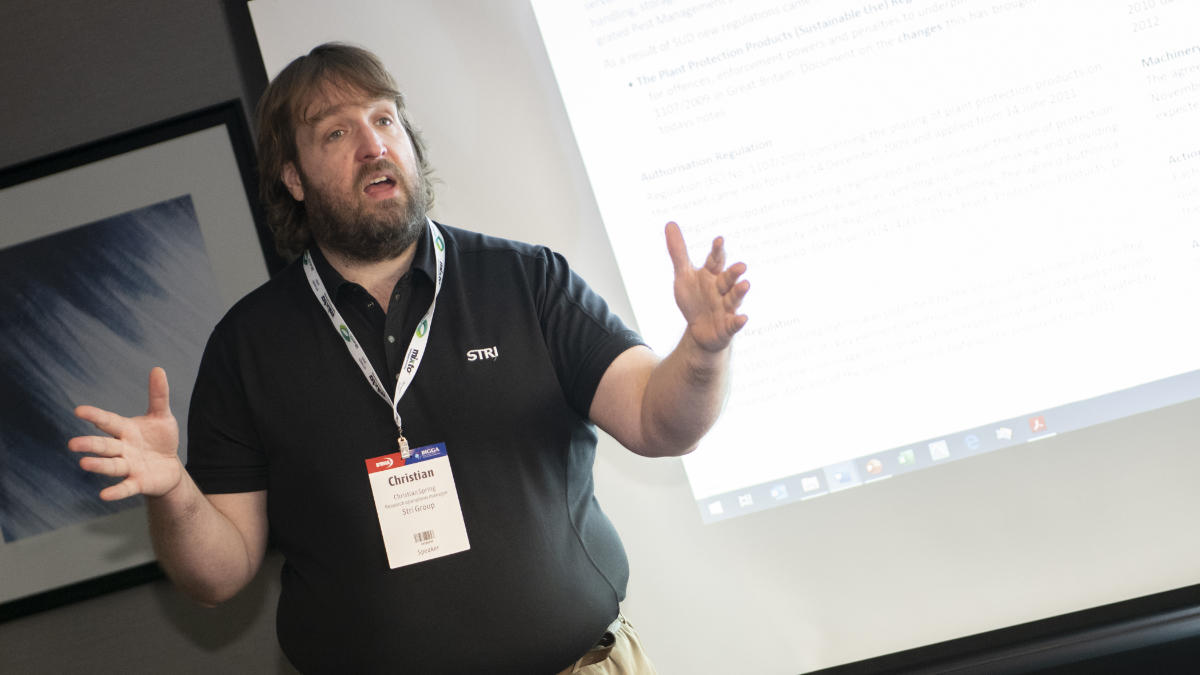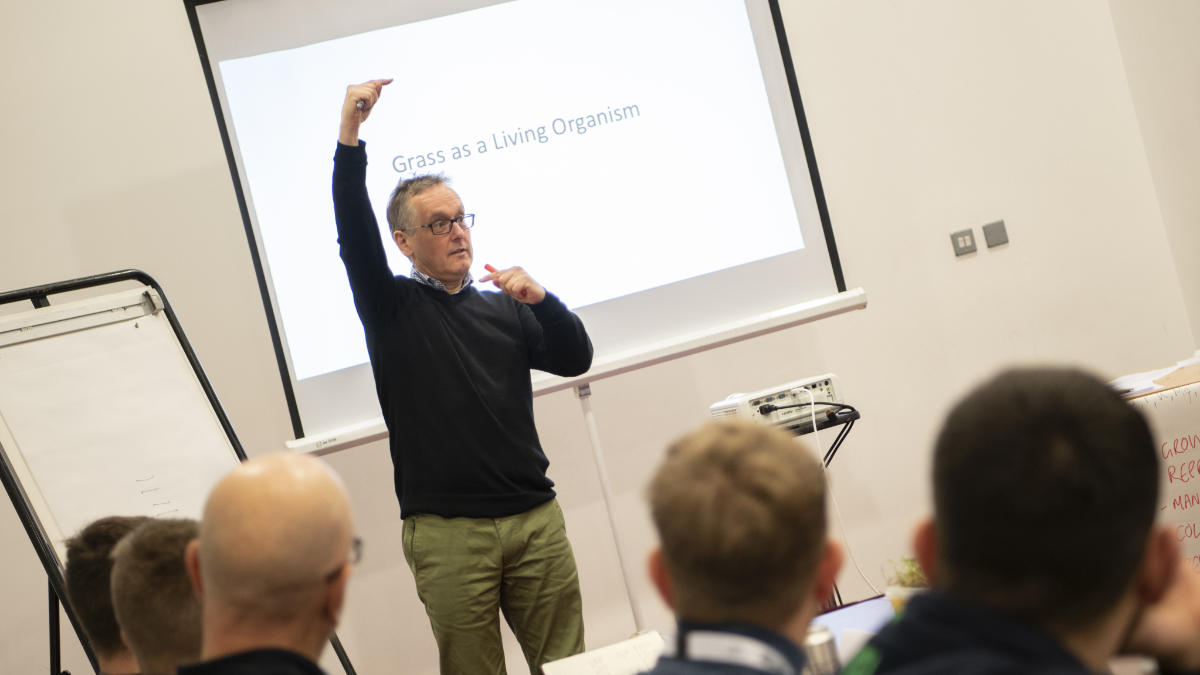- Homepage
- News and Features
- The R&A joining Continue to Learn programme to discuss the future of the game
The R&A joining Continue to Learn programme to discuss the future of the game

Members of The R&A team will be joining expert speakers to participate in a range of talks taking place as part of BIGGA’s Continue to Learn education programme this January.
Due to the ongoing coronavirus pandemic, Continue to Learn and BTME aren’t taking place in Harrogate this month. But we know how important it is for BIGGA members to access the best and most innovative professional education available, which is why we’re hosting Continue to Learn as an entirely-online event.
The R&A is supporting BIGGA in the hosting of Continue to Learn 2021 and we’re proud that a series of talks will take place discussing The R&A’s innovative Golf Course 2030 initiative. During Continue to Learn, we’ll hear from a wide range of speakers about the research that’s taken place so far as the golf industry looks to face the challenges of the coming decade head on.
We hope you’ll join us for what stands to be a fascinating and important couple of days!
Integrated Turf Management Projects
Presented by Maria Strandberg, STERF (Scandinavian Turfgrass and Environment Research Foundation); Conor Nolan, STRI Group; Tanja Espevig, NIBIO; Paul Woodham, STRI Group; Dr Christian Spring, STRI Group
Introduction
• Why are these projects important and how will GC2030 engage with the industry?
• The pressure of climate and legislative change
o Drivers for adaption - Challenges and opportunities
o High quality playing surfaces and ITM
o Natural resources and climate changes
o National and international regulations
o Ecosystem services and biodiversity
• Similarities and differences between STRI and STERF projects
o STERF´s direct connection with the Nordic golf federations and how research areas and projects are prioritised by the golf clubs.
An introduction to Integrated Turf Management in GB & I - Best Practice for Parkland Poa/Agrostis Golf Greens:
• Developing a best practice management handbook
• Collating new and existing knowledge into a central resource
• Supported by data
o Headlines from STRI Programme data 2012-19
o Headlines from Parkland greens management survey
• What is next with the project?
An introduction to Integrated Disease and Pest Management in Europe:
• Objectives of this 4-year project.
• How the research is designed.
• Early observations.
Boosting resilience, mitigating erosion – coastal management (1)
Ray Lawrenson, Siskin Asset Management; Jaap Flikweert, Royal Haskoning DHV; Victoria Clipsham, Royal Haskoning DHV
Coastal management (2)
William Austin, University of St Andrews; Jaap Flikweert, Royal Haskoning DHV; Victoria Clipsham, Royal Haskoning DHV
Coastal change impacts on the integrity of golf courses lying on or near to coastline. Erosion can result in the loss of parts of the course, heavier rainfall events and rising sea levels are likely to have an increasing effect on the playability of coastal courses, perhaps their very existence, over the next 50-80 years.
There are five Golf Course 2030 projects related to coastal change and this webinar will provide an update on work completed to date, and that planned for 2021. The projects are:
• Coastal course survey: current levels of coastal management understanding and engagement
• Coastal Management Innovations: enabling the golfing community to apply innovative coastal management approaches and consider ecosystem benefits in their management decisions, to secure a sustainable long-term future.
• Coastal Management Study: helping the golfing community play its role in coastal management to secure a sustainable long-term future.
• Demonstration project for an innovative system of erosion mitigation of coastline at risk
• A Blue Carbon audit of coastal golf courses: new opportunities for climate and coastal change mitigation and adaptation
Golf Course 2030: Where will you get your water?
Presented by Dr Tom Young, STRI Group; Phil Williams, EPG
Water is a critical natural resource for golf course management. The main aim of the research project is to provide easily accessible information to be provided for practitioners in order to make changes to current water management strategies, be that for irrigation or drainage. Current best climate predictions on the effect of climate change on water management on golf courses in the UK and Ireland will be presented in the form of an interactive portal allowing users to view different geographic areas at different times in the future. Climate change predictions will inform summaries of alternative and future water management strategies that will be provided on the portal for easy practitioner access.

Perspectives on the future of greenkeeper education
Presented by Paul Miller, SRUC
This presentation brings together two projects carried out as part of the R&A's Golf Course 2030 initiative. The combination of impacts from climate change, resource constraints and regulation will require an agile, adaptable and resilient greenkeeping workforce. The ability to adapt to change will be critical and the education provided to greenkeepers throughout their careers must reflect this. The skills to meet these challenges demands respect and the profile of the course manager must be raised to recognise their talents and professionalism.
Standards for the golf course
Presented by Dr Stewart Brown, University Centre Myerscough; Dr Christian Spring, STRI Group; Dr John Fry, University Centre Myerscough
Golf green quality has been a discussion point since the first golf green was built. Over the years, various efforts have been made, with varying success, to produce golf green quality standards. However, what is meant by the term quality? This could purely focus on the quality and nature of ball surface interaction or it could also focus on the visual aesthetic and “playability” of the green and its architecture. The objectives of this STRI managed project have always been to understand and set out what is meant by golf green quality, understand the relationships among the key factors, review how golf green quality can be assessed and the methods available for doing this.
Beyond the greens, golf course standards should be an important element of effective performance-based management, resource efficiency, and player satisfaction. The University Centre Myerscough managed project aims to provide a coherent and consistent set of real-world standards for various areas of the golf course environment, including tees, fairways, green approaches, bunkers and mown rough.
The decision-making process for grass selection
Presented by Dr Christian Spring, STRI Group
Adjusting sward species composition to one which results in both better playing qualities and greater sustainability takes significant time to accomplish and requires the growing environment to be right to allow change to occur. On top of this, the challenges likely to occur on golf courses over the next 10 years, in terms of resource availability, climate change impacts and regulatory pressures, there is a vital need to develop guidance to help with the decision-making process about grass selection, be that for cool season, warm season or transition zone areas.
Aggregates: Their availability for golf courses and alternative solutions/products
Presented by Dr Christian Spring, STRI Group
Sands and gravels play a crucial role in golf course construction, renovation and maintenance. They are, however, a finite natural resource and there have been reports that some grades used on golf courses will run out within the next 30 years. What will courses currently using these products turn to? Are different grades an option or are there alternatives materials, with a much longer life-expectancy that would be suitable?
Click here to book your spot at Continue to Learn 2021.
Author

Karl Hansell
Karl has been head of communications for BIGGA since March 2016. His duties include editing the monthly Greenkeeper International magazine, in addition to other communications activities for the association.


